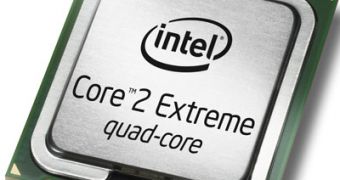Intel yesterday stunned the CES audience when it announced the launch of no less than 16 45-nanometer processors in the Penryn family. Shock grew even bigger when the chip manufacturer stated that the quad-core mobile processors will be substantially delayed due to power consumption-related issues.
Intel's 45-nanometer Core 2 Duo processors will be available for laptops built on the Centrino mobile platform. The new CPU's are known for their improved performance and energy efficiency, according to Mooly Eden, vice president and general manager of Intel Mobile Platforms Group.
The dual-core products are mature and ready for notebook inclusion, as they manage not to suck the battery dry. The quad-core 45-nanometer processors, however, provide more computing power, but they have power-consumption issues and can not perform decently in a mobile, battery-powered environment.
Eden refused to detail upon the company's mobile quad-core processor roadmap, but confirmed that the dual-core processors will continue to dominate the notebook market for a long period of time now. It is likely that the quad-core processors will penetrate the market in high-end gaming and workstation notebooks where the computing requirements would prevail over the battery autonomy.
Currently, Penryn-based Core 2 Duo processors take advantage of an advanced power management technology, called Deep Power Down Technology (DPDT) that throttles the CPU clock according to the computing requirements.
The refurbished Centrino mobile platform, codenamed "Santa Rosa Refresh" will feature the Intel Mobile 965 processor and will provide support for 802.11n wireless networking. The "Montevina" upgrade is part of the company's "research and improve" strategy and will arrive during the second half of this year. Intel has announced that the Montevina refresh will integrate Echo Peak, a mini-card that merges WiMax and Wi-Fi technologies on a single chip.
As of the moment of this writing, no computer vendors announced any systems including the new processors.

 14 DAY TRIAL //
14 DAY TRIAL //